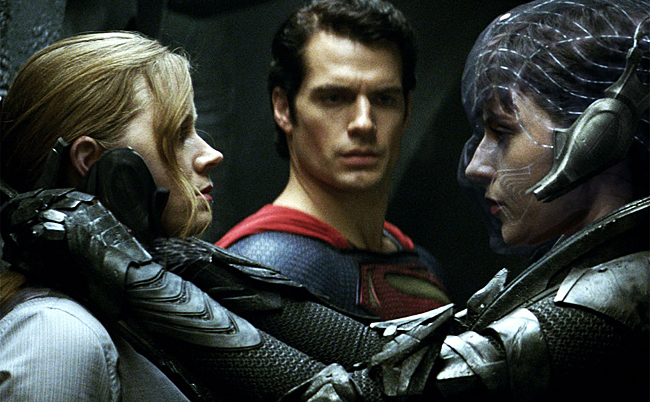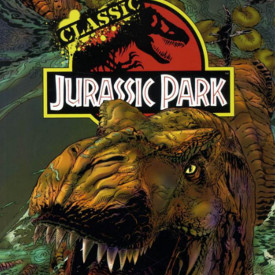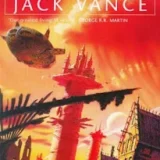
Warning: Minor Man of Steel spoilers follow.
In all fairness, Zack Snyder’s Man of Steel is a beautiful movie. It’s the kind of thing you’d expect from a “New 52”-era DC Comics adaptation: loads of fun, generally on par with Nolan’s Dark Knight trilogy, light-years beyond lesser attempts like Martin Campbell’s Green Lantern (2011), and far more mature than its ho-hum predecessor, Bryan Singer’s Superman Returns (’06). I found myself engaged with the story, caring about the sense of literal alienation David S. Goyer builds around Clark Kent (Henry Cavill), and loving every tense, gorgeous minute of the CGI spectacle.
It is easily the best-looking, most visionary of all the DC films to date, and will in all likelihood serve as the company’s flagship blockbuster, in much the same way as Jon Favreau’s Iron Man launched the Avengers franchise into existence.
But unfortunately, in light of a number of recent controversies within geek culture, I had my feelers out for gender bias last night, and what I noticed about the film’s portrayal of women left me enormously let down. How could a film released in 2013, in the wake of Snyder’s own widely-criticized Sucker Punch, reduce the role of women as much as Man of Steel does?
For starters, the film effectively bombs the Bechdel test. Two women, Diane Lane’s underutilized turn as Martha Kent and Amy Adams’ similarly underwritten Lois Lane, talk to one another on-screen for just a single scene—in which the topic of discussion is, well . . . Superman.
That’s it.
The remainder of the film finds women in largely trivial, or at least traditional, roles, with the possible exception of Faora: a murderous Kryptonian sociopath. No, I’m not kidding.
While Kal-El’s (Superman’s) father, Jor-El (Russell Crowe), achieves a kind of ghostlike immortality through his world’s cerebral upload technology just before a heroic on-screen death, his wife Lara dies afterward during Krypton’s destruction—and is never seen or heard from again. Barely mentioned, in fact. While Clark tells his Earth mother, Martha Kent, near the movie’s end, “I found my real parents . . . ,” the truth is, he only communes with the phantom consciousness of his deceased father. He doesn’t even bother to ask Jor-El about his mother.
As much as I loved the film, and no matter how perfect some aspects of its otherwise rich story are, I can’t help but lament the fact that all women in the film but one are reduced to the roles of damsels-in-distress and childbirthers. It’s more than disappointing; it’s downright sexist. And appallingly so, given the age we live in.
Even the gender-flipped Jenny Jurwich character (Goyer’s version of Superman’s longtime pal Jimmy Olsen, evidently) exists solely to get trapped underneath some rubble, and then be rescued by men. Lois Lane begins her journey in search of the alien who will become Superman as just a curious reporter, but quickly becomes enamored with him . . . without much explanation, really, except for meeting the demands of the formulaic Hollywood plot.
After boldly following Kal-El aboard General Zod’s Kryptonian warship, Lane carries out her single biggest contribution to the film by discovering how to defeat the superhuman invasion force; but it’s Jor-El’s consciousness, the mind of a man, who shows her—and then the rest of her efforts take place off-camera, while the audience is spoonfed some more flashy shots of Superman fighting Zod and making a catastrophic mess of Metropolis in the process.
Even from a less critical, more—(sigh)—traditional view, Kent’s inevitable relationship with Lois Lane ultimately feels thoughtless and forced; they appear to care for one another simply because that’s what they’ve always done. Not because there’s any genuine character development taking place between the two, or because the story serves to build their love.
When you’ve got an actress of Amy Adams’ caliber at your disposal, that’s more than a little disappointing, frankly. But that’s no fault of the performers. Doubtless the unquestionable demands of the studio kept the script and final edit as lean and fast-paced as possible, leaving little room for more than a few minutes’ worth of genuine humanity and on-screen chemistry. So why have a love subplot at all? Save it for the sequel.
As it stands, Lois Lane in Man of Steel is left utterly objectified. Despite a few good lines—and some truly awful ones (“If we’re done measuring dicks . . .”)—and regardless of how convincing Adams is in the midst of what must have been an ocean of greenscreen. An object of affection, and a damsel to be rescued when the plot demands more overdramatized peril.
Last night, my inner child felt ready to proclaim to the world that cinema had found its new Greatest Superhero Film of All Time, superior to the works of Nolan, Snyder’s own Watchmen, and the now-classic Donner outings. But I can’t ignore the trivialization of women’s roles in popular entertainment any longer. What might have been a near-perfect, grand vision is marred by the absence of anything new, commendable, or progressive. Man of Steel plays it safe in its political message—and does a great disservice to twenty-first-century notions of gender.
Want to add to the discussion? Let us know what you think of the trend toward male-centric superhero films and the damsel-in-distress stereotype in our comments section below, or send an email to the author at alexkanefiction@gmail.com.
Alex Kane is an author, blogger, and critic whose work has appeared in Futuredaze: An Anthology of YA Science Fiction, Digital Science Fiction, and Foundation, among other places. He lives in the small college town of Monmouth, Illinois, where he earned a B.A. in English, and was recently named a finalist in the international Writers of the Future contest. Visit him online at alexkanefiction.com.










Thanks for this, Alex. I haven’t seen the movie yet (plan to and I’m sure I’ll be swept away), but am disappointed that I’ll have to try and ignore what you’ve described as the absence of any female of substance. I agree with your sentiment that it is unworthy of our societal norms these days and really a shame that the old dinosaurs still seem to wield the club. It seems like something that would be very easy to do differently without any detraction from the action-heavy movie.